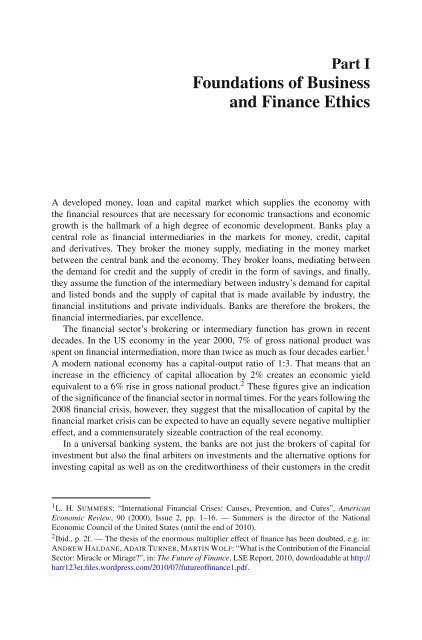The Ethics of Banking: Conclusions from the Financial Crisis (Issues ...
The Ethics of Banking: Conclusions from the Financial Crisis (Issues ...
The Ethics of Banking: Conclusions from the Financial Crisis (Issues ...
Create successful ePaper yourself
Turn your PDF publications into a flip-book with our unique Google optimized e-Paper software.
Part I<br />
Foundations <strong>of</strong> Business<br />
and Finance <strong>Ethics</strong><br />
A developed money, loan and capital market which supplies <strong>the</strong> economy with<br />
<strong>the</strong> financial resources that are necessary for economic transactions and economic<br />
growth is <strong>the</strong> hallmark <strong>of</strong> a high degree <strong>of</strong> economic development. Banks play a<br />
central role as financial intermediaries in <strong>the</strong> markets for money, credit, capital<br />
and derivatives. <strong>The</strong>y broker <strong>the</strong> money supply, mediating in <strong>the</strong> money market<br />
between <strong>the</strong> central bank and <strong>the</strong> economy. <strong>The</strong>y broker loans, mediating between<br />
<strong>the</strong> demand for credit and <strong>the</strong> supply <strong>of</strong> credit in <strong>the</strong> form <strong>of</strong> savings, and finally,<br />
<strong>the</strong>y assume <strong>the</strong> function <strong>of</strong> <strong>the</strong> intermediary between industry’s demand for capital<br />
and listed bonds and <strong>the</strong> supply <strong>of</strong> capital that is made available by industry, <strong>the</strong><br />
financial institutions and private individuals. Banks are <strong>the</strong>refore <strong>the</strong> brokers, <strong>the</strong><br />
financial intermediaries, par excellence.<br />
<strong>The</strong> financial sector’s brokering or intermediary function has grown in recent<br />
decades. In <strong>the</strong> US economy in <strong>the</strong> year 2000, 7% <strong>of</strong> gross national product was<br />
spent on financial intermediation, more than twice as much as four decades earlier. 1<br />
A modern national economy has a capital-output ratio <strong>of</strong> 1:3. That means that an<br />
increase in <strong>the</strong> efficiency <strong>of</strong> capital allocation by 2% creates an economic yield<br />
equivalent to a 6% rise in gross national product. 2 <strong>The</strong>se figures give an indication<br />
<strong>of</strong> <strong>the</strong> significance <strong>of</strong> <strong>the</strong> financial sector in normal times. For <strong>the</strong> years following <strong>the</strong><br />
2008 financial crisis, however, <strong>the</strong>y suggest that <strong>the</strong> misallocation <strong>of</strong> capital by <strong>the</strong><br />
financial market crisis can be expected to have an equally severe negative multiplier<br />
effect, and a commensurately sizeable contraction <strong>of</strong> <strong>the</strong> real economy.<br />
In a universal banking system, <strong>the</strong> banks are not just <strong>the</strong> brokers <strong>of</strong> capital for<br />
investment but also <strong>the</strong> final arbiters on investments and <strong>the</strong> alternative options for<br />
investing capital as well as on <strong>the</strong> creditworthiness <strong>of</strong> <strong>the</strong>ir customers in <strong>the</strong> credit<br />
1 L. H. SUMMERS: “International <strong>Financial</strong> Crises: Causes, Prevention, and Cures”, American<br />
Economic Review, 90 (2000), Issue 2, pp. 1–16. — Summers is <strong>the</strong> director <strong>of</strong> <strong>the</strong> National<br />
Economic Council <strong>of</strong> <strong>the</strong> United States (until <strong>the</strong> end <strong>of</strong> 2010).<br />
2 Ibid., p. 2f. — <strong>The</strong> <strong>the</strong>sis <strong>of</strong> <strong>the</strong> enormous multiplier effect <strong>of</strong> finance has been doubted, e.g. in:<br />
ANDREW HALDANE,ADAIR TURNER,MARTIN WOLF: “What is <strong>the</strong> Contribution <strong>of</strong> <strong>the</strong> <strong>Financial</strong><br />
Sector: Miracle or Mirage?”, in: <strong>The</strong> Future <strong>of</strong> Finance, LSE Report, 2010, downloadable at http://<br />
harr123et.files.wordpress.com/2010/07/future<strong>of</strong>finance1.pdf.

















